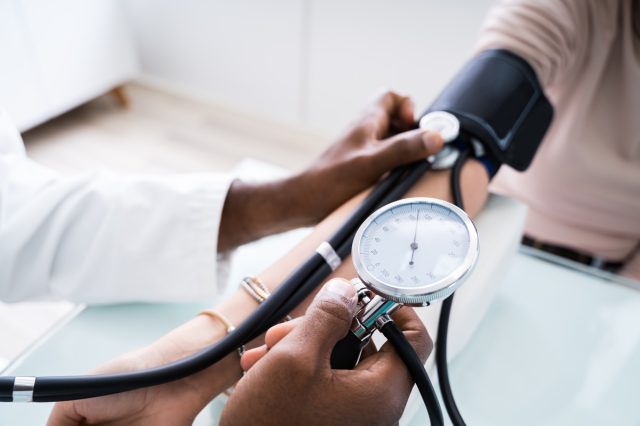Is Coffee Good for You? Here’s What the Science Says

The way you start your morning can set the tone for the rest of your day. Perhaps, this is why many people make sure they have a cup of coffee (or two) on hand before they get too far into their morning routine. Whether you’re a “one cup a day” type of coffee drinker or if you find yourself having your third cup by mid-afternoon, this caffeinated beverage can bring a little piece of joy to your day when you need it most—not to mention give you a zap of energy, too. But aside from giving you a bit more pep in your stem in the morning, coffee has also been linked to a handful of side effects. So is coffee good for you?
On the one hand, research shows that regular coffee consumption may be able to help prevent numerous diseases, improve your mood, and help you achieve your weight loss goals. Still, this caffeinated beverage isn’t for everyone, as those with panic disorder or hypertension may want to limit how much they consume. To find out whether or not drinking coffee regularly is truly beneficial to your health, we took a deep dive into the science behind this drink’s potential effects.
A look at the nutrition info for coffee

Before looking into the possible benefits and side effects of drinking coffee, the nutrition information for both brewed coffee and espresso can already tell us quite a bit off the bat. Both drinks are derived from the beans of a coffee plant and contain helpful micronutrients like magnesium and potassium. The key differentiator between these two beverages is the methods in which they are made. Brewed coffee is what you get when you use a regular automatic coffee pot, a pour-over, or a Chemex. A shot of espresso is made with an espresso machine, which uses pressurization to extract an ounce or two of highly extracted coffee. As a result, espresso tends to have higher caffeine content and contains a few more calories than a cup of basic Joe.
Brewed hot coffee (8 ounces)
- 2.4 calories
- 94.8 milligrams of caffeine
- 7.1 milligrams of magnesium
- 116 milligrams of potassium
- 4.7 milligrams of sodium
Espresso (2 ounces)
- 5.4 calories
- 127 milligrams of caffeine
- 48 milligrams of magnesium
- 69 milligrams of potassium
- 8.4 milligrams of sodium
Despite their different brew approaches and minor variations in their nutrition information, the benefits and side effects of drinking both coffee bean-based drinks still apply to bother espresso and coffee to some degree. Whether you have coffee or espresso, awareness of the health pros and cons of drinking these beverages can empower you to make the best beverage choice for you. So, is coffee good for you? Read on to learn more about the possible benefits and side effects of this beloved beverage—and for more advice on your favorite morning beverages, be sure to check out Is Orange Juice Good For You?
7 benefits of drinking coffee
1.) Coffee can be good for your heart health.

Your morning cup of coffee can instantly put you in a better mood and nourish your soul—but did you know it can also help you have a healthier heart, too?
According to a review from the Journal of Agricultural and Food Chemistry, consuming three to five cups of coffee regularly was associated with a 15% lower risk of developing cardiovascular disease in “healthy people.” Furthermore, having between one to five cups daily was linked to a lower risk of death when compared to not having any coffee at all. It was also concluded that if you had previously experienced a cardiovascular event, drinking coffee is not going to increase your risk of another heart-related issue.
Aside from these findings, another review of 21 studies published in the Journal of Stroke and Cerebrovascular Diseases concluded that drinking around three to four cups of coffee daily was associated with a 21% lower risk of stroke. However, there was not a significant difference found after the four-cup amount.
2.) It will give you a temporary energy boost.
Sure, coffee can taste quite good. But let’s face it, the reason people find themselves attached to this beverage is because of its caffeine content. With 127 milligrams in a double espresso or about 95 milligrams in one brewed cup of coffee, you’ll naturally feel a jolt of energy when you sip on your favorite kind of coffee.
But how exactly does caffeine give you energy? The answer is in how it interacts with your brain. Studies show that caffeine actually blocks certain neurotransmitters and leaves room for others—specifically, those linked to your energy levels, with the most common example being dopamine. This process has been found to increase alertness in those consuming any form of caffeine.
3.) It may lower your risk of developing dementia and Alzheimer’s disease.

Drinking coffee consistently over time has also been shown to have long-term effects on your brain and cognitive health. A 2016 study assessing the effects of habitual coffee consumption and potential cognitive decline noted a reduced risk of developing Alzheimer’s disease. Another 2021 study published in PLOS Medicine found that drinking coffee and tea (either together or separately) was associated with a lower risk of dementia. Researchers in this study also concluded that these beverages were linked to a reduced risk of post-stoke dementia, as well.
4.) Coffee can help support weight management.
Another benefit of coffee is that this drink can help you in your goals of weight loss or weight management, especially because coffee contains specific plant compounds and polyphenols that are known to help prevent obesity and other forms of metabolic syndrome. For instance, a 2021 meta-analysis published in Nutrients concluded that drinking coffee regularly was linked to reduced abdominal fat and abdominal obesity (adiposity). These results were specifically higher in men, but showed up in women, as well.
When considering how coffee may impact your weight loss goals, it’s important to consider how you drink it. While drinking your coffee black may be the easiest way to keep the sugar and calorie counts low, if you prefer having your cup of Joe with sugar and/or cream, just be mindful of how much you mix in. Also, try to avoid super-sugary fast-food coffees when you can.
5.) Coffee may help reduce the risk of certain cancers.

There are always many factors at play regarding your risk of developing certain diseases, but research has found multiple links specifically to coffee consumption and cancer. According to a study published in the International Journal of Cancer, coffee plays a significant role in hormonal health and carrying important antioxidants. This is why coffee has been linked to a reduced risk of endometrial cancer, which is cancer that affects the lining of the uterus.
The journal Nutrition and Cancer also highlights this association between coffee consumption and endometrial cancer. However, it also notes that there was no significant link between coffee and cancer of the breast, pancreas, kidney, prostate, ovaries, or stomach.
6.) It can help reduce the risk of developing type 2 diabetes.
Your favorite coffee may be able to help lower your risk of diabetes, and according to Diabetes Care, this goes for both caffeinated and decaffeinated coffee. This is because the link between this beverage and diabetes has less to do with the caffeine in coffee, and more to do with how it interacts with your pancreas. A review published in Nutrients concluded that coffee could help with the functionality of your pancreas’ beta cells, which are the cells that produce insulin and help with your body’s blood sugar.
7.) It can also help support your mental health.
Most people probably feel a little bit happier after their first few sips of coffee in the morning, but aside from this temporary moment of joy, coffee may also contribute to your mental health in the long run, too. A meta-analysis published in the Australian & New Zealand Journal of Psychiatry found that drinking caffeinated coffee helped reduce the risk of depression in participants. Specifically, researchers found the best results when people consumed above 68 milligrams and less than 509 milligrams a day.
Even though these results are promising for coffee lovers, it’s important to seek help beyond a cup of Joe if you’re experiencing depression or related mental health concerns. Talk with a doctor or licensed counselor if you think you may have symptoms of depression.
2 side effects of drinking coffee
1.) Coffee may exacerbate anxiety symptoms.
Have you ever sipped on a bit too much coffee and found yourself feeling jittery or even anxious? Although not everyone has this experience, for those who do, it could be because of coffee’s caffeine content. The relationship between coffee and anxiety depends on the person’s existing anxiety disorder and sensitivity to caffeine. Usually, it takes a larger amount of caffeine—around five cups of coffee—to induce feelings of panic or anxiety in people, and this happens more frequently with people who already have a panic disorder. So if you’re someone with a panic disorder or who finds themselves feeling anxious regularly, you may want to limit the amount of coffee you’re consuming.
2.) It may elevate your blood pressure.

In addition to noting the potential positive effects drinking coffee can have on your heart health, researchers from the aforementioned review from the Journal of Agricultural and Food Chemistry note that their results mean something different for people with uncontrolled high blood pressure, otherwise known as hypertension. In fact, they say that those who live with hypertension should monitor their levels of caffeine and avoid large amounts of coffee, as the caffeine in this drink can cause spikes in blood pressure.
- Source: https://pubs.acs.org/doi/abs/10.1021/acs.jafc.7b04506
- Source: https://www.strokejournal.org/article/S1052-3057(20)30870-3/fulltext/
- Source: https://www.sciencedirect.com/science/article/pii/S1319016420300359?via%3Dihub/
- Source: https://www.sciencedirect.com/science/article/abs/pii/S0899900715005389?via%3Dihub/
- Source: https://pubmed.ncbi.nlm.nih.gov/33992045/
- Source: https://www.ncbi.nlm.nih.gov/pmc/articles/PMC6628169/
- Source: https://onlinelibrary.wiley.com/doi/full/10.1002/ijc.27408/
- Source: https://www.tandfonline.com/doi/full/10.1080/01635580903407122/
- Source: https://diabetesjournals.org/care/article/37/2/569/29536/Caffeinated-and-Decaffeinated-Coffee-Consumption/
- Source: https://www.mdpi.com/2072-6643/13/4/1144/
- Source: https://journals.sagepub.com/doi/10.1177/0004867415603131
- Source: https://pubmed.ncbi.nlm.nih.gov/25471197/
- Source: https://pubmed.ncbi.nlm.nih.gov/34871964/







